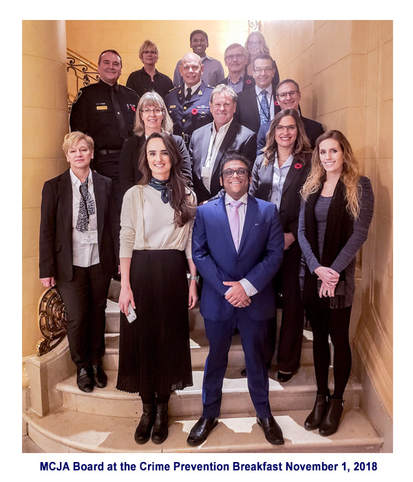The MCJA exists to promote rational, informed, and responsible debate to contribute to the development of a more humane, equitable, and effective justice system. Our membership ranges from current and retired police officers, to lawyers, psychiatrists, government employees at all levels including probation officers and even a dentist to name just a few professions. It is a collection of diverse educational, occupational, cultural and most importantly, “thought” backgrounds.
2019 MCJA Board
Objectives
The objectives of the MCJA are:
- To promote and encourage the participation of, and cooperation between, all community members and justice system professionals in Manitoba who are interested in issues that result from criminal behaviour.
- To foster an environment for the expression of diverse interests in criminal justice, and facilitate the sharing of information between the justice system and the community.
- To promote awareness of issues surrounding the administration of justice, prevention of crime, protection of the public, probation and parole, and correctional institutions.
- To help promote and coordinate crime prevention strategies through community involvement and networking opportunities.
- To participate in programs aimed at increasing public awareness and understanding of current issues in the Canadian criminal justice system, including legislation, criminal justice services, education, rehabilitation and victim services.
- To encourage research addressing criminal justice issues.
History
The Manitoba Criminal Justice Association (MCJA) was founded in November 1969 by four local members of the then Canadian Corrections Association (now the Canadian Criminal Justice Associatoin). At this inaugural meeting of the MCJA, originally called the Manitoba Society of Criminology Inc., the purpose was to explore the interest and need for a multi-disciplinary society focused on the field of corrections. The immediate interest and participation of a widely representative group of individuals involved in corrections in Manitoba confirmed the appropriateness of such an organization. A steering committee was chosen to begin detailed organization of the society.
The MCJA was founded on a strong commitment to involve and reflect the views of people from all areas of the criminal justice system, and to address problems arising within this system. The Association set out to become a forum where those from all disciplines and professions concerned with crime and corrections could meet to exchange ideas and express opinions in order to broaden their own knowledge and experience, as well as that of the general public. The original objectives were:
The MCJA pursued these objectives in as vigorous and diverse a fashion as possible given the limitations of its budget and a voluntary Board of Directors, executive officers and committee members. It held a variety of public seminars, meetings and conferences, as well as engaging in special projects and consultations at both at its own initiative and at the request of the provincial and federal governments, in cooperation with other non-governmental organizations.
It is notable that the MCJA has been and continues to be the only inter-disciplinary forum in the area of criminal justice in Manitoba. It represents non-partisan positions, providing an opportunity for a synthesis of opinions from all areas of corrections, irrespective of profession, program or employment affiliation. This position of independence and neutrality places the Association in an ideal position to act as a consultant to government, as well as an information conduit between the criminal justice field, agencies and legislators.
In 1975, the MCJA became incorporated as a non-profit organization.
(Click here to read more about the history of the Manitoba Criminal Justice Association from 1969-1983)
The MCJA was founded on a strong commitment to involve and reflect the views of people from all areas of the criminal justice system, and to address problems arising within this system. The Association set out to become a forum where those from all disciplines and professions concerned with crime and corrections could meet to exchange ideas and express opinions in order to broaden their own knowledge and experience, as well as that of the general public. The original objectives were:
- to encourage cooperation among all individuals and groups in the Province of Manitoba interested in problems that derive from criminal and delinquent behaviour;
- to study the problems posed by the administration of justice, prevention of crime, protection, probation and parole, correctional institutions, and of related groups, agencies and services concerned with the treatment of offenders;
- to develop public understanding of the above problems;
- to encourage criminological research.
The MCJA pursued these objectives in as vigorous and diverse a fashion as possible given the limitations of its budget and a voluntary Board of Directors, executive officers and committee members. It held a variety of public seminars, meetings and conferences, as well as engaging in special projects and consultations at both at its own initiative and at the request of the provincial and federal governments, in cooperation with other non-governmental organizations.
It is notable that the MCJA has been and continues to be the only inter-disciplinary forum in the area of criminal justice in Manitoba. It represents non-partisan positions, providing an opportunity for a synthesis of opinions from all areas of corrections, irrespective of profession, program or employment affiliation. This position of independence and neutrality places the Association in an ideal position to act as a consultant to government, as well as an information conduit between the criminal justice field, agencies and legislators.
In 1975, the MCJA became incorporated as a non-profit organization.
(Click here to read more about the history of the Manitoba Criminal Justice Association from 1969-1983)
about our logo

The design of the Manitoba Criminal Justice Association logo was modeled from that of our national affiliate, the Canadian Criminal Justice Association with both logos being symbolic of our national and provincial histories and our shared beliefs, morals, and values.
The only modification made was that the red maple leaf, symbolic of the good and positive values and traditions shared by Canadians, was replaced by the Manitoba Bison, a symbol of strength, abundance and unity.
The core of the design is ringed by a series of tightly arranged dots indicative of the medicine wheels outlined with stones by the Canadian Aboriginals as part of their traditional spiritual rites. Its intent is to remind us of our heritage and of those things therapeutic and beneficial for our community as a whole.
The circular formation representing seven persons with arms outstretched, exalting and at the same time protecting that which is typified by the bison. The number seven is representative of the community aspects: ancestral, spiritual, economic, social, political, industrial, and cultural.
Alternating with the stylized persons are seven crown-like figures that signify the Canadian home. The number seven represents the cardinal virtues: justice, prudence, temperance, fortitude, faith, hope, and charity.
The only modification made was that the red maple leaf, symbolic of the good and positive values and traditions shared by Canadians, was replaced by the Manitoba Bison, a symbol of strength, abundance and unity.
The core of the design is ringed by a series of tightly arranged dots indicative of the medicine wheels outlined with stones by the Canadian Aboriginals as part of their traditional spiritual rites. Its intent is to remind us of our heritage and of those things therapeutic and beneficial for our community as a whole.
The circular formation representing seven persons with arms outstretched, exalting and at the same time protecting that which is typified by the bison. The number seven is representative of the community aspects: ancestral, spiritual, economic, social, political, industrial, and cultural.
Alternating with the stylized persons are seven crown-like figures that signify the Canadian home. The number seven represents the cardinal virtues: justice, prudence, temperance, fortitude, faith, hope, and charity.
constitution and by-laws
The Constitution of the Manitoba Criminal Justice Association was ratified by its members at the Annual General Meeting held in January 2010. The Constitution documents are available below:
MCJA Constitution By-Law No. 1 By-Law No. 2 By-Law No. 3
MCJA Constitution By-Law No. 1 By-Law No. 2 By-Law No. 3


